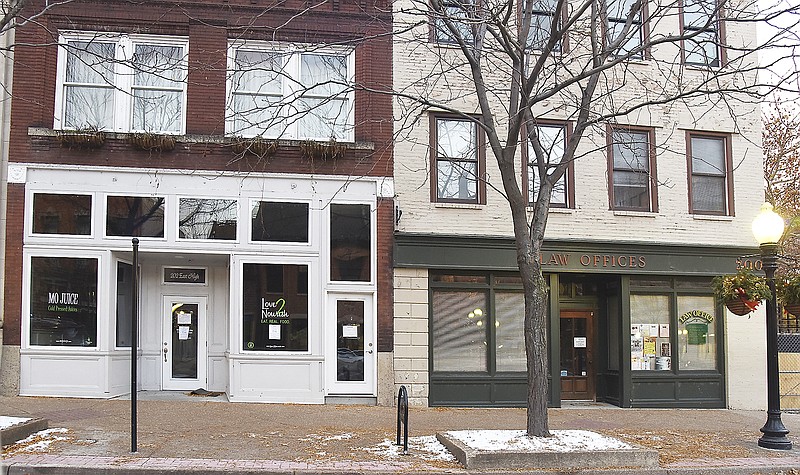If no action is taken to demolish the crumbling building at 200 E. High St. or the building at 202 E. High St., the Jefferson City Planning and Protective Services Department is preparing to pay for demolition.
At Thursday morning's Public Works and Planning Committee meeting, department Director Sonny Sanders told the committee he will be initiating a request for a $300,000 supplemental appropriation from the Jefferson City Council at the Monday meeting.
Nearly 18 months ago, a west-facing wall of the building at 200 E. High St. started crumbling into Madison Street. There are fears demolishing that building could cause issues for 202 E. High St. or even 204 E. High St., down the line, which houses Bar Vino.
Sanders said the request is for demolition of "one or the other, or both" of the buildings, but they are unsure yet what it could be used for.
This will only happen if the property owners don't take action by Dec. 9.
"If one property owner starts repairs, a building permit or starts demolishing the building, we won't demolish that building," Sanders said. "We might have to do 202, so they can safely do 200. We really don't know how it's going to wash out."
The supplemental appropriation will be heard Monday by the council and could be voted on at the Dec. 2 meeting.
If the city spends the money to demolish either building, the cost will be considered a personal debt of the property owners, City Counselor Ryan Moehlman said.
The Public Works and Planning Committee also advanced a small change to the International Property Maintenance Code during a meeting Thursday.
The 2015 version of the code was adopted by the city in 2017, but some small changes are needed to make the internationally used code meet regional needs.
"When we adopted the code, we did not make a change that allows us to require a heat supply, so we're basically putting the dates in that code," said Sonny Sanders, director of the Department of Planning & Protective Services.
A small section in Chapter 8 of the code regards heat supply for rented properties. According to the code, every owner or operator who rents, leases or lets one or more dwelling units has to furnish heat to the occupants.
The change adds a date range to the heat supply rule - from Sept. 1 through June 1, heat must be available to maintain a minimum temperature of 68 degrees Fahrenheit in all habitable rooms. Currently, the date space in the code is blank.
Sanders said not specifying the date was simply an oversight when the code was adopted.
The proposed change will move forward to the Jefferson City Council in December.
Also Thursday, the committee heard a suggested change to the city's method of determining construction value from Building Official Larry Burkhardt.
The change would allow a building plan review fee to be collected and allow an equitable means to determine minimum new construction value.
Construction values are used to determine the fee amount for a building permit - the construction value times 0.005 for non-residential or 0.0025 for residential, according to the proposed bill.
Burkhardt is proposing the minimum value amount to reduce disagreements relating to undervalued construction valuations.
"I would only use this tool if someone comes in with a very, very low valuation," Burkhardt said. "I look at things, I can tell when somebody is giving me a low-ball number."
The change would also switch the method of valuation for new construction from using RS Means - a type of cost-estimating software, which is currently required in the code - to using the International Code Council square foot costs, which should be less time consuming for city staff and would allow for the use of a minimum value.
During the building permit application process, plans are submitted for review of conformance with building code. The proposed building plan review fee would help the city recover costs for the time it takes to review the plans for those where a building permits is not issued.
The fee for non-residential projects that require plans would be 20 percent of the permit fee, which would then be credited to the building permit fee if a permit is given.
The committee suggested the change not proceed to the Jefferson City Council until Burkhardt receives responses from some stakeholders on the proposed changes.
In other business, the committee again heard from airport tenants about the possibility of reducing or suspending fees from leasing ground for hangars from the city. Due to flooding, the airport hangars weren't accessible for about two months.
Tenants originally requested the suspension in June, when the water hadn't yet receded. At Thursday's meeting, Jonathan and Angie Abbott, who operate a business out of one of the hangars, brought the suggestion to the committee again.
Britt Smith, city operations division director, said the economic impact of forgiving all the airport lease fees would be about $15,000.

